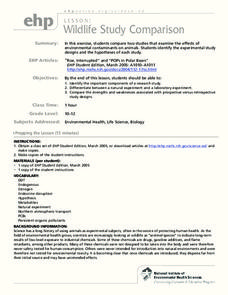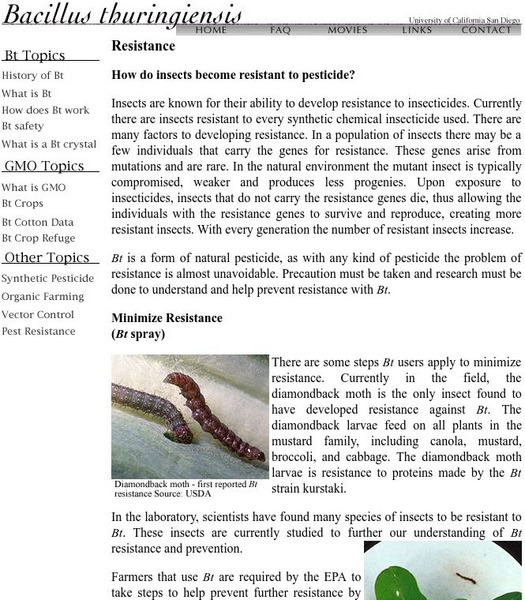Curated OER
A Yen for Maximum Residue Limits in Food
Future public health officials or agriculturists read an article and answer questions concerning the Japanese regulations for pesticide exposure. They compare the maximum residue limit for two, 4-D of Japan with other countries. This is...
Curated OER
Organic Feud
Young scholars examine possible pesticide exposure in their fruit and vegetable consumption. They compile fact sheets exploring various organic food issues and interview their parents about the food choices they make for their Students.
Curated OER
Wildlife Study Comparison
Environmental science classes read articles about two different scientific studies. One is about the effects of contraceptive chemicals on fertility, and the other is about how a pesticide may be reducing bone density in exposed...
Curated OER
Pyrethroid Panic?
Future public health officials read about the exposure to pyrethroid pesticides and analyze box plots of pesticide use, diet, and children's ages. They discuss whether or not there are any relationships in the data. If you feel this...
Curated OER
Exposure!
Students investigate that chemicals may affect different people in different ways. They also realize that their perceptions of dangerous materials may not be realistic and that the news media may not provide all the information needed to...
Curated OER
Fertilizers, Pesticides and Human Health
Students define several vocabulary terms related to chemicals and toxicology. Students calculate chemical concentrations in water and explain the toxicological principles that govern safety of substances. Students conduct an...
Curated OER
Close Encounters
Students investigate the cause of death of a fictitious school janitor. They develop hypotheses based on information discovered by examining the labels of household chemicals.
Curated OER
Pollinator Habitats
Students read and discuss background information included with this lesson. They brainstorm the best sources for developing a list of native or migratory pollinators. Students work in groups to design habitats based on information...
Curated OER
Integrated Pest Management
Students compare and contrast the role of the honeybee in nature. They find information by using a variety of resources that could include the internet. Students take part in a paper and pencil formal evaluation with questions that...
US Environmental Protection Agency
Epa: Assessing Health Risks From Pesticides
This site provides information about the active ingredients registered as pesticides. Site discusses toxicology, exposure, dose-response and risk characterization.
University of California
Bacillus Thuringiensis: How Do Insects Become Resistant to Pesticide?
Insects are known for their ability to develop resistance to insecticides. Currently there are insects resistant to every synthetic chemical insecticide used. There are many factors to developing resistance. In a population of insects...
Other
Elements Online: Are Animals Effective in Testing?
This site questions the use of animals, specifically in the testing of prolonged exposure to pesticides. This article argues that, although pesticides have been found "safe" through animal testing, the long-term effects on humans has not...











